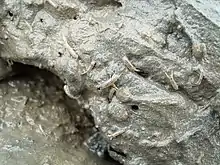Corophium volutator
Corophium volutator is a species of amphipod crustacean in the family Corophiidae.[2] It is found in mudflats of the northern Atlantic Ocean.[3] It is native to the north-east Atlantic Ocean, and has been introduced to the north-west Atlantic.[4]
| Corophium volutator | |
|---|---|
 | |
| Scientific classification | |
| Domain: | Eukaryota |
| Kingdom: | Animalia |
| Phylum: | Arthropoda |
| Class: | Malacostraca |
| Superorder: | Peracarida |
| Order: | Amphipoda |
| Family: | Corophiidae |
| Genus: | Corophium |
| Species: | C. volutator |
| Binomial name | |
| Corophium volutator | |
| Synonyms [2] | |
| |
Description
Corophium volutator is a slender animal, up to 11 millimetres (0.43 in) long, "whitish with brown markings".[5] The head bear two pairs of antennae, the first of which are small and point forwards, while the distinctive second pair are much longer and thicker.[5]
Life cycle
There are 1–2 generations per year,[6] and the females brood the eggs inside their brood pouch or marsupium.[7] They can occur in huge quantities: up to 60,000 per square metre have been observed.[7]
References
- Mark Costello & Denise Bellan-Santini (2011). Lowry J (ed.). "Corophium volutator (Pallas, 1766)". World Amphipoda database. World Register of Marine Species. Retrieved April 12, 2012.
- M. J. de Kluijver & S. S. Ingalsuo (1999). Macrobenthos of the North Sea. Archived from the original on 2011-07-17. Retrieved 2006-06-29.
- Veronika Gerdol & R. G. Hughes (1994). "Feeding behaviour and diet of Corophium volutator in an estuary in southeastern England" (PDF). Marine Ecology Progress Series. 114: 103–108. doi:10.3354/meps114103.
- A. L. Einfeldt & J. A. Addison (2015). "Anthropocene invasion of an ecosystem engineer: resolving the history of Corophium volutator (Amphipoda: Corophiidae) in the North Atlantic". Biological Journal of the Linnean Society. 115 (2): 288–304. doi:10.1111/bij.12507.
- Ken Neal & Penny Avant (2006). "Corophium volutator, a mud shrimp". Marine Life Information Network: Biology and Sensitivity Key Information Sub-programme. Marine Biological Association of the United Kingdom. Retrieved April 12, 2012.
- W. Herbert Wilson, Jr. & Kristian Parker (1996). "The life history of the amphipod, Corophium volutator: the effects of temperature and shorebird predation". Journal of Experimental Marine Biology and Ecology. 196 (1–2): 239–250. doi:10.1016/0022-0981(95)00133-6.
- J. A. Percy (1999). "Master of the Mudflats". Bay of Fundy Ecosystem Partnership.
This article is issued from Wikipedia. The text is licensed under Creative Commons - Attribution - Sharealike. Additional terms may apply for the media files.